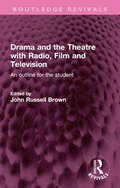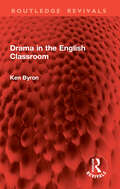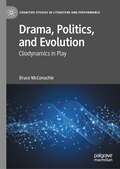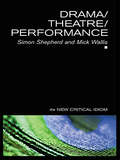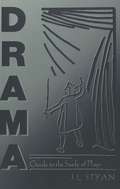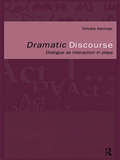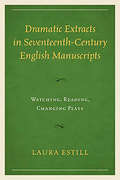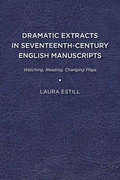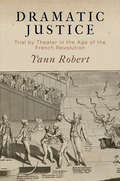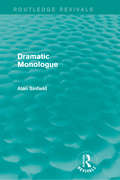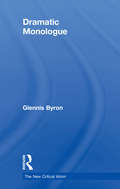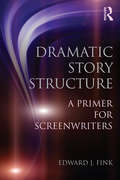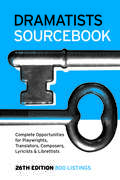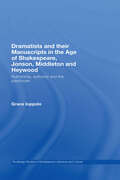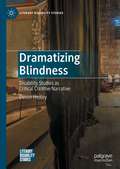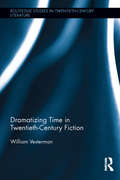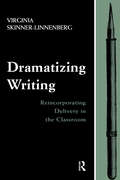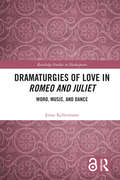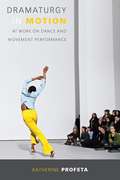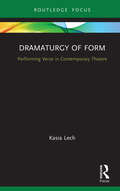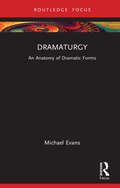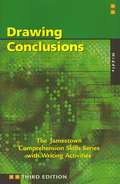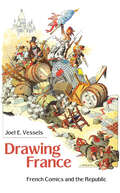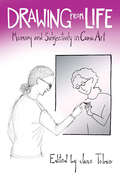- Table View
- List View
Drama and the Theatre with Radio, Film and Television: An outline for the student (Routledge Revivals)
by John Russell BrownFirst published in 1971, Drama and the Theatre with Radio, Film and Television is concerned with the nature of theatre as a subject for study and the ways of studying it. All its contributors have practical experience of staging plays for professional or student companies, or for both. Necessarily, attention is chiefly focused on the main elements of plays in performance in theatres, now and in the past. The chosen topics place more specialized studies in a wider context, because such a book as this needs, above all, to give an impression of general scope. It is intended for those aiming for a theatre career and for young students interested in theatre.
Drama in the English Classroom (Routledge Revivals)
by Ken ByronFirst published in 1986, Drama in the English Classroom demonstrates the contribution of drama in an English classroom. It suggests that drama activities, language work, and the reading of fiction can all enrich each other in ways which promote the aims of the English teacher.The author draws on his own classroom experience and on that of the teachers whom he guided (on long-term in-service work) through the process of learning to use drama effectively. He offers many examples to illustrate the opportunities and the problems of using drama in English. Planning, key drama strategies, major pitfalls, evaluation, and the rewards of drama are examined from the viewpoint of an English teacher who senses that drama has a great deal to offer in the classroom but is at first unsure of what and how. As major part of his book is presented in form of a teacher’s journal, we see the author trying things, reflecting on the result, talking to a more experienced colleague, and steadily finding out what drama can contribute and how he can achieve this in his teaching. This book is an encouraging and helpful guide for anyone who wishes to use drama effectively but is unsure of the first steps.
Drama, Politics, and Evolution: Cliodynamics in Play (Cognitive Studies in Literature and Performance)
by Bruce McConachieThis book outlines the evolution of our political nature over two million years and explores many of the rituals, plays, films, and other performances that gave voice and legitimacy to various political regimes in our species’ history. Our genetic and cultural evolution during the Pleistocene Epoch bestowed a wide range of predispositions on our species that continue to shape the politics we support and the performances we enjoy. The book’s case studies range from an initiation ritual in the Mbendjela tribe in the Congo to a 1947 drama by Bertolt Brecht and include a popular puppet play in Tokugawa Japan. A final section examines the gradual disintegration of social cohesion underlying the rise of polarized politics in the USA after 1965, as such films as The Godfather, Independence Day, The Dark Knight Rises, and Joker accelerated the nation’s slide toward authoritarian Trumpism.
Drama/Theatre/Performance (The New Critical Idiom)
by Simon Shepherd Mick WallisWhat is implied when we refer to the study of performing arts as 'drama', 'theatre' or 'performance'? Each term identifies a different tradition of thought and offers different possibilities to the student or practitioner. This book examines the history and use of the terms and investigates the different philosophies, politics, languages and institutions with which they are associated. Simon Shepherd and Mick Wallis: analyze attitudes to drama, theatre and performance at different historical junctures trace a range of political interventions into the field(s) explore and contextualise the institutionalisation of drama and theatre as university subjects, then the emergence of 'performance' as practice, theory and academic disciplines guide readers through major approaches to drama, theatre and performance, from theatre history, through theories of ritual or play, to the idea of performance as paradigm for a postmodern age discuss crucial terms such as action, alienation, catharsis, character, empathy, interculturalism, mimesis, presence or representation in a substantial 'keywords' section. Continually linking their analysis to wider cultural concerns, the authors here offer the most wide-ranging and authoritative guide available to a vibrant, fast-moving field and vigorous debates about its nature, purpose and place in the academy.
Drama: A Guide to the Study of Plays
by J. L. StyanThis book introduces the elements of drama and the principles behind the reading and study of plays--classical and modern. It makes a special point of seeing drama as intended for acting and performance, and it therefore emphasizes the role of the spectator at a play and the sort of theatre for which drama was written. The performance approach to the study of plays finally clarifies the different kinds of drama (comedy, tragedy, melodrama, and farce) and identifies its forms (realism, stylization, and symbolism). The book draws on specific examples of drama, is rich in helpful charts and diagrams, and contains a comprehensive glossary. This book will be a useful guide for students and general playgoers alike.
Dramatic Discourse: Dialogue as Interaction in Plays
by Vimala HermanWhilst poetry and fiction have been subjected to extensive linguistic analysis, drama has long remained a neglected field for detailed study. Vimala Herman argues that drama should be of particular interest to linguists because of its form, dialogue and subsequent translation into performance. The subsequent interaction that occurs on stage is a rich and fruitful source of analysis and can be studied by using discourse methods that linguists employ for real-life interaction. Shakespeare, Pinter, Osborne, Beckett, Chekhov, and Shaw are just some of the dramatists whose material is drawn upon. Each chapter contains a theoretical section in which major concepts of each framework are explained before the relevance of the framework to dramatic discourse is analyzed and explored using textual examples. This book will be of interest to undergraduates and postgraduates studying in the areas of literary linguistics and stylistics, or anyone specialising in the relationship between the text and performance.
Dramatic Extracts in Seventeenth-Century English Manuscripts: Watching, Reading, Changing Plays
by Laura EstillThroughout the seventeenth century, early modern play readers and playgoers copied dramatic extracts (selections from plays and masques) into their commonplace books, verse miscellanies, diaries, and songbooks. Dramatic Extracts in Seventeenth-Century English Manuscripts: Watching, Reading, Changing Plays is the first to examine these often overlooked texts, which reveal what early modern audiences and readers took, literally and figuratively, from plays. As this under-examined archival evidence shows, play readers and playgoers viewed plays as malleable and modular texts to be altered, appropriated, and, most importantly, used. These records provide information that is not available in other forms about the popularity and importance of early modern plays, the reasons plays appealed to their audiences, and the ideas in plays that most interested audiences. Tracing the course of dramatic extracting from the earliest stages in the 1590s, through the prolific manuscript circulation at the universities, to the closure and reopening of the theatres, Estill gathers these microhistories to create a comprehensive overview of seventeenth-century dramatic extracts and the culture of extracting from plays. Dramatic Extracts in Seventeenth-Century English Manuscripts: Watching, Reading, Changing Plays explores new archival evidence (from John Milton’s signature to unpublished university plays) while also analyzing the popularity of perennial favorites such as Shakespeare’s The Tempest. The study of dramatic extracts is the study of particulars: particular readers, particular manuscripts, particular plays or masques, particular historic moments. As D. F. McKenzie puts it, “different readers [bring] the text to life in different ways.” By providing careful analyses of these rich source texts, this book shows how active play-viewing and play-reading (that is, extracting) ultimately led to changing the plays themselves, both through selecting and manipulating the extracts and positioning the plays in new contexts. Published by University of Delaware Press. Distributed worldwide by Rutgers University Press.
Dramatic Extracts in Seventeenth-Century English Manuscripts: Watching, Reading, Changing Plays
by Laura EstillThroughout the seventeenth century, early modern play readers and playgoers copied dramatic extracts (selections from plays and masques) into their commonplace books, verse miscellanies, diaries, and songbooks. Dramatic Extracts in Seventeenth-Century English Manuscripts: Watching, Reading, Changing Plays is the first to examine these often overlooked texts, which reveal what early modern audiences and readers took, literally and figuratively, from plays. As this under-examined archival evidence shows, play readers and playgoers viewed plays as malleable and modular texts to be altered, appropriated, and, most importantly, used. These records provide information that is not available in other forms about the popularity and importance of early modern plays, the reasons plays appealed to their audiences, and the ideas in plays that most interested audiences. Tracing the course of dramatic extracting from the earliest stages in the 1590s, through the prolific manuscript circulation at the universities, to the closure and reopening of the theatres, Estill gathers these microhistories to create a comprehensive overview of seventeenth-century dramatic extracts and the culture of extracting from plays. Dramatic Extracts in Seventeenth-Century English Manuscripts: Watching, Reading, Changing Plays explores new archival evidence (from John Milton’s signature to unpublished university plays) while also analyzing the popularity of perennial favorites such as Shakespeare’s The Tempest. The study of dramatic extracts is the study of particulars: particular readers, particular manuscripts, particular plays or masques, particular historic moments. As D. F. McKenzie puts it, “different readers [bring] the text to life in different ways.” By providing careful analyses of these rich source texts, this book shows how active play-viewing and play-reading (that is, extracting) ultimately led to changing the plays themselves, both through selecting and manipulating the extracts and positioning the plays in new contexts. Published by University of Delaware Press. Distributed worldwide by Rutgers University Press.
Dramatic Justice: Trial by Theater in the Age of the French Revolution
by Yann RobertFor most of the seventeenth and eighteenth centuries, classical dogma and royal censorship worked together to prevent French plays from commenting on, or even worse, reenacting current political and judicial affairs. Criminal trials, meanwhile, were designed to be as untheatrical as possible, excluding from the courtroom live debates, trained orators, and spectators. According to Yann Robert, circumstances changed between 1750 and 1800 as parallel evolutions in theater and justice brought them closer together, causing lasting transformations in both.Robert contends that the gradual merging of theatrical and legal modes in eighteenth-century France has been largely overlooked because it challenges two widely accepted narratives: first, that French theater drifted toward entertainment and illusionism during this period and, second, that the French justice system abandoned any performative foundation it previously had in favor of a textual one. In Dramatic Justice, he demonstrates that the inverse of each was true. Robert traces the rise of a "judicial theater" in which plays denounced criminals by name, even forcing them, in some cases, to perform their transgressions anew before a jeering public. Likewise, he shows how legal reformers intentionally modeled trial proceedings on dramatic representations and went so far as to recommend that judges mimic the sentimental judgment of spectators and that lawyers seek private lessons from actors. This conflation of theatrical and legal performances provoked debates and anxieties in the eighteenth century that, according to Robert, continue to resonate with present concerns over lawsuit culture and judicial entertainment.Dramatic Justice offers an alternate history of French theater and judicial practice, one that advances new explanations for several pivotal moments in the French Revolution, including the trial of Louis XVI and the Terror, by showing the extent to which they were shaped by the period's conflicted relationship to theatrical justice.
Dramatic Monologue (Routledge Revivals)
by Alan SinfieldFirst published in 1977, this book looks at the versatile literary form of dramatic monologue. Although it is often associated with Browning and other poets writing between 1830 and 1930, the concept has been employed by diverse poets of multiple periods such as Ovid, Chaucer, Donne, Blake, Wordsworth, Philip Larkin and Ted Hughes. In this study, Alan Sinfield demonstrates and analyses the range and adaptability of the form through detailed examples. He shows that the technique maintains a shifting and uncertain balance between the voices of the poet and of his created speaker; when extended, as in Maud, Amours de Voyage, The Ring and the Book, and The Wasteland, the use of dramatic monologue raises questions of personality and perception. In the second part of the text, the author discusses the origins of Victorian and Modernist dramatic monologue in the dramatic complaint and the Ovidian verse epistle of earlier periods, offering a new interpretation of the value of dramatic monologue to Browning and Tennyson. Through his writing, Alan Sinfield successfully highlights the eternal vibrance of the form.
Dramatic Monologue (The New Critical Idiom)
by Glennis ByronThe dramatic monologue is traditionally associated with Victorian poets such as Robert Browning and Alfred Tennyson, and is generally considered to have disappeared with the onset of modernism in the twentieth century. Glennis Byron unravels its history and argues that, contrary to belief, the monologue remains popular to this day. This far-reaching and neatly structured volume: * explores the origins of the monologue and presents a history of definitions of the term* considers the monologue as a form of social critique* explores issues at play in our understanding of the genre, such as subjectivity, gender and politics* traces the development of the genre through to the present day. Taking as example the increasingly politicized nature of contemporary poetry, the author clearly and succinctly presents an account of the monologue's growing popularity over the past twenty years.
Dramatic Story Structure: A Primer for Screenwriters
by Edward J. FinkA successful screenplay starts with an understanding of the fundamentals of dramatic story structure. In this practical introduction, Edward J. Fink condenses centuries of writing about dramatic theory into ten concise and readable chapters, providing the tools for building an engaging narrative and turning it into an agent-ready script. Fink devotes chapters to expanding on the six basic elements of drama from Aristotle’s Poetics (plot, character, theme, dialogue, sound, and spectacle), the theory and structure of comedy, as well as the concepts of unity, metaphor, style, universality, and catharsis. Key terms and discussion questions encourage readers to think through the components of compelling stories and put them into practice, and script formatting guidelines ensure your finished product looks polished and professional. Dramatic Story Structure is an essential resource not only for aspiring screenwriters, but also for experienced practitioners in need of a refresher on the building blocks of storytelling.
Dramatists Sourcebook
by Theatre Communications Group"A treasure trove of sound advice and practical information for the working writer."-Donald Margulies, Pulitzer Prize-winning playwrightCalled "the essential guide to professional opportunities and playscript procedures" by the Dramatist Guild of America, the Dramatists Sourcebook contains more than eight hundred opportunities for playwrights, translators, composers, lyricists, and librettists, including script-submission procedures for more than three hundred professional theaters; more than one hundred prizes; and scores of publishers, fellowships, residencies, agents, and reference publications. This fully revised edition is thoroughly indexed and contains a calendar of submission guidelines and Tony Kushner's "Simple Working Guide for Playwrights."
Dramatists and their Manuscripts in the Age of Shakespeare, Jonson, Middleton and Heywood: Authorship, Authority and the Playhouse (Routledge Studies in Renaissance Literature and Culture #Vol. 6)
by Grace IoppoloThis book presents new evidence about the ways in which English Renaissance dramatists such as William Shakespeare, Ben Jonson, Thomas Heywood, John Fletcher and Thomas Middleton composed their plays and the degree to which they participated in the dissemination of their texts to theatrical audiences. Grace Ioppolo argues that the path of the transmission of the text was not linear, from author to censor to playhouse to audience - as has been universally argued by scholars - but circular. Extant dramatic manuscripts, theatre records and accounts, as well as authorial contracts, memoirs, receipts and other archival evidence, are used to prove that the text returned to the author at various stages, including during rehearsal and after performance. This monograph provides much new information and case studies, and is a fascinating contribution to the fields of Shakespeare studies, English Renaissance drama studies, manuscript studies, textual study and bibliography and theatre history.
Dramatizing Blindness: Disability Studies as Critical Creative Narrative (Literary Disability Studies)
by Devon HealeyDramatizing Blindness: Disability Studies as Critical Creative Narrative engages with the cultural meanings and movements of blindness. This book addresses how blindness is lived in particular contexts—in offices of ophthalmology and psychiatry, in classrooms of higher education, in accessibility service offices, on the street, and at home. Taking the form of a play written in five acts, the narrative dramatizes how the main character’s blindness is conceived of in the world and in the self. Each act includes an analysis where blind studies is explored in relation to disability studies. This work reveals the performative enactment of blindness that is lived in the public as well as in the private corners of the self, demonstrating how blindness is a form of perception. Devon Healey’s work orients to blindness as a necessary and creative feature of the sensorium and shows how blindness is a form of perception.
Dramatizing Time in Twentieth-Century Fiction (Routledge Studies in Twentieth-Century Literature)
by William VestermanHow have twentieth-century writers used techniques in fiction to communicate the human experience of time? Dramatizing Time in Twentieth-Century Fiction explores this question by analyzing major narratives of the last century that demonstrate how time becomes variously manifested to reflect and illuminate its operation in our lives. Offering close readings of both modernist and non-modernist writers such as Wodehouse, Stein, Lewis, Joyce, Hemingway, Faulkner, Borges, and Nabokov, the author shares and unifies the belief, as set forth by the distinguished philosopher Paul Ricoeur, that narratives rather than philosophy best help us understand time. They create and communicate its meanings through dramatizations in language and the reconfiguration of temporal experience. This book explores the various responses of artistic imaginations to the mysteries of time and the needs of temporal organization in modern fiction. It is therefore an important reference for anyone with an interest in twentieth-century literature and the philosophy of time.
Dramatizing Writing: Reincorporating Delivery in the Classroom
by Virginia Skinner-LinnenbergAlthough speech departments have "owned" delivery for the last 100 years, those who teach writing, especially English departments, can gain a great deal by reinstating delivery into their conceptions of and theories about writing. Thus, in the author's vision of "dramatizing writing" in the composition classroom, delivery can have an impact on all the composing steps, from invention to final draft. The goals of this text are to redefine delivery for writing, to reunite it with other parts of the classical rhetorical canon, and to practically apply it in contemporary writing instruction. This text is divided into three main sections. The first provides a survey of the history of delivery in rhetorical theory. A continuum is set up from a totally physical conception of delivery to a noetic one which incorporates more intellectual processes. The argument is that the tension heightened by discord over its definition eventually led to the splitting of delivery from the rhetorical canon. A separate discussion of the women's challenge to delivery is also included. The next section contains a survey of facets of delivery that exist in current theory combined with the author's own theory of delivery. It provides insight into the state of delivery in contemporary writing instruction. The author argues that since the split of delivery from the rhetorical canon has caused a modern bias against delivery in writing theory, many strategies that could aid in the teaching of writing have either been overlooked or undertheorized. Therefore, she borrows from current theoretical areas within and outside of writing in order to construct her own theory of delivery. The last section provides practical applications of delivery in writing instruction. Again borrowing from many sources inside and outside of composition, she describes the techniques teachers may use to incorporate delivery in a writing classroom. Through the use of delivery, more strategies may be developed to aid in the teaching of writing. Special features include: * the incorporation of some practices that had been in use in the composition classroom for many years but did not have any consciously theoretical grounding; * the discussion of women rhetoricians' theories on delivery; * the combination of many contemporary theoretical areas including theatrical, feminist, rhetorical, and pedagogical to form the author's redefined theory of delivery; and * the presentation of practical applications of this new theory of delivery for teachers to utilize in their own classrooms.
Dramaturgies of Love in Romeo and Juliet: Word, Music, and Dance (Routledge Studies in Shakespeare)
by Jonas KellermannBringing together current intermedial discourses on Shakespeare, music, and dance with the affective turn in the humanities, Dramaturgies of Love in Romeo and Juliet offers a unique and highly innovative transdisciplinary discussion of ‘unspeakable’ love in one of the most famous love stories in literary history: the tragic romance of Romeo and Juliet. Through in-depth case studies and historical contextualisation, this book showcases how the ‘woes that no words can sound’ of Shakespeare’s iconic lovers nevertheless have found expression not only in his verbal poetry, but also in non-verbal adaptations of the play in 19th-century symphonic music and 20th- and 21st-century theatre dance. Combining methodological approaches from diverse disciplines, including affect theory, musicology and dance studies, this study opens up a new perspective onto the artistic representation of love, defining amorous emotion as a generically transformative constellation of dialogic performativity. To explore how this constellation has become manifest across the arts, this book analyses and compares dramatic, musical, and choreographic dramatisations of love in William Shakespeare’s early modern tragedy, French composer Hector Berlioz’s dramatic symphony Roméo et Juliette (1839), and the staging of Berlioz’s symphony by German contemporary choreographer Sasha Waltz for the Paris Opera Ballet (2007).
Dramaturgy and Dramatic Character
by William StormDramatic character is among the most long-standing and familiar of artistic phenomena. From the theatre of Dionysus in ancient Greece to the modern stage, William Storm's book delivers a wide-ranging view of how characters have been conceived at pivotal moments in history. Storm reaffirms dramatic character as not only ancestrally prominent but as a continuing focus of interest. He looks closely at how stage figures compare to fictional characters in books, dramatic media, and other visual arts. Emphasis is sustained throughout on fundamental questions of how theatrical characterization relates to dramatic structure, style, and genre. Extensive attention is given to how characters think and to aspects of agency, selfhood, and consciousness. As the only book to offer a long view of theatrical characterization across this historical span, Storm's dramaturgical and theoretical investigation examines topics that remain vital and pertinent for practitioners, scholars, students of theatre and literature, and general audiences.
Dramaturgy in Motion
by Katherine ProfetaDramaturgy in Motion innovatively examines the work of the dramaturg in contemporary dance and movement performance. Katherine Profeta, a working dramaturg for more than fifteen years, shifts the focus from asking "Who is the dramaturg?" to "What does the dramaturg think about?" Profeta explores five arenas for the dramaturg's attention--text and language, research, audience, movement, and interculturalism. Drawing on her extended collaboration with choreographer and visual artist Ralph Lemon, she grounds her thinking in actual rehearsal-room examples and situates practice within theoretical discourse about contemporary dramaturgy. Moving between theory and practice, word and movement, question and answer until these distinctions blur, she develops the foundational concept of dramaturgical labor as a quality of motion. Dramaturgy in Motion will be invaluable to practitioners and scholars interested in the processes of creating contemporary dance and movement performance--particularly artists wondering what it might be like to collaborate with a dramaturg and dramaturgs wondering what it might be like to collaborate on movement performance. The book will also appeal to those intrigued by the work of Lemon and his collaborators, to which Profeta turns repeatedly to unfold the thorny questions and rich benefits of dramaturgical labor.
Dramaturgy of Form: Performing Verse in Contemporary Theatre (Focus on Dramaturgy)
by Kasia LechDramaturgy of Form examines verse in twenty-first-century theatre practice across different languages, cultures, and media. Through interdisciplinary engagement, Kasia Lech offers a new method for verse analysis in the performance context. The book traces the dramaturgical operation of verse in new writings, musicals, devised performances, multilingual dramas, Hip Hop theatre, films, digital projects, and gig theatre, as well as translations and adaptations of classics and new theatre forms created by Irish, Spanish, Nigerian, Polish, American, Canadian, Australian, British, Russian, and multinational artists. Their verse dramaturgies explore timely issues such as global identities, agency and precarity, global and local politics, and generational and class stories. The development of dramaturgy is discussed with the focus turning to the new stylized approach to theatre, whose arrival Hans-Thies Lehmann foretold in his Postdramatic Theatre, documenting a turning point for contemporary Western theatre. Serving theatre-makers, scholars, and students working with classical and contemporary verse and poetry in performance contexts; practitioners and academics of aural and oral dramaturgies; voice and verse-speaking coaches; and actors seeking the creative opportunities that verse offers, Dramaturgy of Form reveals verse as a tool for innovation and transformation that is at the forefront of contemporary practices and experiences.
Dramaturgy: An Anatomy of Dramatic Forms (Focus on Dramaturgy)
by Michael EvansHow are plays constructed? Taking this essential question and looking at a broad range of Western plays, from Greek tragedies through Ibsen, we can discern a remarkably stable set of dramaturgical principles.Some dramatists adhere to traditional principles to create meaning, while others delight in bending or breaking these conventions, seeking new ways to express meaning. In this book, Michael Evans discusses what he calls “standard dramaturgy” – a set of seven principles upon which most plays, from ancient Greek dramas to modern works, are based. He teases out seven traits found in most plays written before 1900 – and many popular plays and films since then. The book then looks at these key traits and how the playwrights of the Modernist era deliberately subvert them to create new methods of meaning. Examining each of these traits with well-chosen examples from dramatic literature, the book highlights these traits and illustrates how dramaturgs can understand instances of meaning within plays.Part of the Routledge Focus on Dramaturgy series, this book will interest scholars and students of dramaturgy, directing, and theatre studies.
Drawing Conclusions (The Jamestown Comprehension Skills Series)
by Glencoe McGraw-Hill Staff Jamestown Publishers StaffThe Comprehension Skills Series teaches students to become stronger, efficient readers by developing ten important, specific reading comprehension skills.
Drawing France: French Comics and the Republic
by Joel E. VesselsIn France, Belgium, and other Francophone countries, comic strips—called bande dessinee or “BD” in French—have long been considered a major art form capable of addressing a host of contemporary issues. Among French-speaking intelligentsia, graphic narratives were deemed worthy of canonization and critical study decades before the academy and the press in the United States embraced comics. The place that BD holds today, however, belies the contentious political route the art form has traveled. In Drawing France: French Comics and the Republic, author Joel E. Vessels examines the trek of BD from it being considered a fomenter of rebellion, to a medium suitable only for semi-literates, to an impediment to education, and most recently to an art capable of addressing social concerns in mainstream culture. In the mid-1800s, alarmists feared political caricatures might incite the ire of an illiterate working class. To counter this notion, proponents yoked the art to a particular articulation of “Frenchness” based on literacy and reason. With the post-World War II economic upswing, French consumers saw BD as a way to navigate the changes brought by modernization. After bande dessinee came to be understood as a compass for the masses, the government, especially Francois Mitterand’s administration, brought comics increasingly into “official” culture. Vessels argues that BD are central to the formation of France’s self-image and a self-awareness of what it means to be French.
Drawing from Life: Memory and Subjectivity in Comic Art
by Jane TolmieAutobiography has seen enormous expansions and challenges over the past decades. One of these expansions has been in comics, and it is an expansion that pushes back against any postmodern notion of the death of the author/subject, while also demanding new approaches from critics. Drawing from Life: Memory and Subjectivity in Comic Art is a collection of essays about autobiography, semi-autobiography, fictionalized autobiography, memory, and self-narration in sequential art, or comics. Contributors come from a range of academic backgrounds including English, American studies, comparative literature, gender studies, art history, and cultural studies. The book engages with well-known figures such as Art Spiegelman, Marjane Satrapi, and Alison Bechdel; with cult-status figures such as Martin Vaughn-James; and with lesser-known works by artists such as Frédéric Boilet. Negotiations between artist/writer/body and drawn/written/text raise questions of how comics construct identity, and are read and perceived, requiring a critical turn towards theorizing the comics' viewer. At stake in comic memoir and semi-autobiography is embodiment. Remembering a scene with the intent of rendering it in sequential art requires nonlinear thinking and engagement with physicality. Who was in the room and where? What was worn? Who spoke first? What images dominated the encounter? Did anybody smile? Man or mouse? Unhinged from the summary paragraph, the comics artist must confront the fact of the flesh, or the corporeal world, and they do so with fascinating results.
